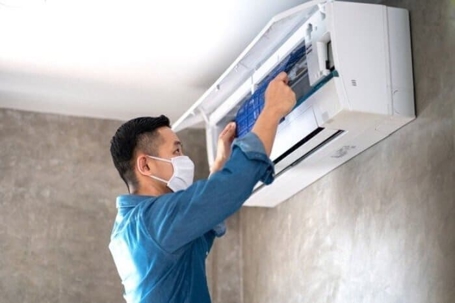Industrial air conditioning (AC) systems play a vital role in regulating temperature and ensuring air quality in various industrial settings, from manufacturing plants to data centers. Given their complexity and the demanding conditions they often operate under, maintaining these systems is crucial for their efficiency and longevity. This article explores the intricacies of industrial AC maintenance, outlining the types of systems, their components, the importance of routine maintenance, essential tasks to ensure optimal performance, seasonal considerations, and more. We will also highlight the criteria for selecting a professional maintenance service and offer insights into DIY maintenance tips suitable for facility managers. By understanding and prioritizing industrial AC maintenance, businesses can realize operational efficiency, reduce costs, and create a comfortable environment for employees.
Overview of Industrial AC Systems
Definition and Importance in Industrial Settings
An industrial HVAC system comprises integrated units that provide heating, ventilation, and air conditioning to more extensive facilities, ensuring optimal temperature and humidity levels for operational efficiency. Unlike residential units prioritize comfort, industrial systems are essential for maintaining product quality, ensuring equipment functionality, and safeguarding employee health. For instance, temperature-sensitive products in food processing or pharmaceuticals require stringent climate control to ensure quality standards are met.
Differences Between Residential and Industrial AC Systems
Industrial AC systems differ significantly from their residential counterparts regarding size, operational demand, and complexity. While residential units focus on comfort for small living spaces, industrial systems must contend with larger areas and often include advanced zoning capabilities to manage different temperature requirements across extensive facilities. Moreover, the machinery and components used in industrial systems are typically more robust, built to withstand high demand, and operate continuously throughout the day.
Purpose of the Article
This article aims to elucidate the various facets of industrial AC maintenance, emphasizing the necessity for routine care to enhance efficiency and extend equipment lifespan. It will provide insights into maintenance protocols, seasonal tasks, and the role of technology in optimizing these systems.
Understanding Industrial AC Systems
1.1 Types of Industrial AC Systems
Chilled Water Systems
Chilled water systems are commonly used in large buildings. They circulate chilled water to air handlers throughout a facility to cool the air. These efficient systems can manage significant cooling loads, making them ideal for data centers and manufacturing settings.
Direct Expansion (DX) Systems
Direct expansion systems utilize refrigerants to cool air directly without the need for water. These systems are often more straightforward in design and widely used in commercial settings, providing heating and cooling capabilities.
Air Handling Units (AHUs)
Air handling units are crucial components in both chilled water and DX systems. They facilitate conditioned air circulation and often integrate heating and cooling functions into a single unit. Air Handling Units can use a combination of outside and recirculated air and depend on duct systems to deliver air throughout a facility.
1.2 Components of Industrial AC Systems
Compressors
The compressor is the heart of any AC system. It circulates refrigerant and facilitates heat exchange. It raises the refrigerant’s pressure, allowing it to absorb and release heat effectively.
Evaporators
The evaporator absorbs heat from the indoor air around it, cooling the environment. It is vital for maintaining desired temperature levels within a facility.
Condensers
The condenser releases heat, and the refrigerant absorbs it to the outside environment, completing the refrigeration cycle. It is typically located outdoors, where it can effectively dispel heat.
Expansion Valves
Expansion valves regulate the flow of refrigerant within the system, transforming high-pressure liquid refrigerant into vapor before entering the evaporator. This step is essential for the AC system’s efficient functioning.
The Importance of Regular Maintenance
2.1 Benefits of Routine Maintenance
Improved Energy Efficiency
Regular maintenance of industrial AC systems results in improved energy efficiency. Well-tuned systems operate smoothly without overexerting energy. Studies have shown that preventative maintenance can lead to energy savings of 10% to 40%.
Extended Equipment Lifespan
By addressing wear and tear and performing routine evaluations, businesses can significantly extend the lifespan of their HVAC systems. Regular servicing prevents malfunctioning parts from escalating into more severe problems that might require costly replacements.
Enhanced Air Quality
Maintaining the cleanliness of ducts, air filters, and other components ensures that the indoor air remains fresh and pollutants-free. This protects equipment and is crucial for maintaining a healthy work environment for employees.
2.2 Cost Implications of Neglecting Maintenance
Increased Energy Bills
Neglecting regular maintenance can lead to increased energy bills due to decreased efficiency. As systems falter and struggle to reach desired temperatures, energy consumption rises, driving up costs significantly.
Frequent Repairs and Replacements
Systems that are not regularly maintained tend to malfunction more frequently, leading to a cycle of unexpected repairs and parts replacements that can severely impact company finances.
Downtime Costs
System breakdowns can result in considerable downtime, halting production processes and leading to revenue losses. By avoiding unplanned breakdowns through proactive maintenance, companies can ensure continuous operations.
Essential Maintenance Tasks for Industrial AC Systems
3.1 Regular Inspection and Cleaning
Importance of Inspecting Coils and Filters
Regular inspections are critical for both the evaporator and condenser coils. Dirty coils limit heat exchange efficiency, severely hindering system performance. Similarly, air filters play a vital role in maintaining air quality and airflow; blocked filters can significantly reduce efficiency, making it crucial to inspect and replace them regularly.
Cleaning Protocols for Different Components
Establishing a comprehensive cleaning protocol that addresses every component of the industrial AC system ensures efficient operation. Recommended cleaning practices include:
- Coils: Regularly clean the condenser and evaporator coils to prevent dirt buildup that affects efficiency.
- Ducts: Conduct periodic cleaning and checks for potential leaks in the ductwork to ensure optimal airflow.
3.2 Refrigerant Management
Check Refrigerant Levels
Maintaining appropriate refrigerant levels is essential for efficient cooling operations. A shortage of refrigerant can strain the compressor and increase energy usage, leading to higher utility costs.
Identifying and Repairing Leaks
Regular inspections for leaks in refrigerant lines and prompt addressing of any found issues are crucial in avoiding costly repairs and enhancing efficiency. Small leaks can lead to significant pressure drops, resulting in suboptimal performance.
3.3 Electrical System Maintenance
Inspecting Wiring and Connections
Electrical components are at the core of any industrial HVAC system. Regular inspection of wiring, fuses, and electrical connections helps prevent unexpected failures and safety hazards, ensuring systems operate safely and optimally.
Testing Electrical Components
Routine testing of electrical components ensures all parts function correctly, reducing the risk of outages that could disrupt operations.
3.4 Ductwork Maintenance
Inspecting for Leaks and Blockages
Ducts play a significant role in an HVAC system’s overall performance. Inspecting them for leaks, blockages, and accumulated debris ensures efficient airflow and high air quality.
Cleaning Ducts and Vents
Regular cleaning of ductwork ensures that the air circulating throughout the facility is clean and free of contaminants. Providing clear pathways for airflow promotes efficiency and enhances indoor air quality.
3.5 Calibration and Testing
Importance of Testing System Performance
Establishing the effectiveness of HVAC systems through regular testing is crucial. Testing ensures that systems maintain proper temperatures and humidity levels. Regular performance evaluations can also catch issues early, preventing costly breakdowns.
Calibrating Thermostats and Controls
Ensuring that thermostats are accurately calibrated allows consistent temperature control throughout a facility. Utilizing programmable thermostats can optimize energy usage by adjusting temperatures based on occupancy patterns.
Seasonal Maintenance Considerations
4.1 Preparing for Summer Operations
Pre-Season Checks and Tasks
As temperature peaks approach, it is vital to ensure that the cooling systems are ready for increased demand. Essential pre-summer tasks include inspecting coils, replacing filters, and checking refrigerant levels to ensure the system is prepared to perform under strain.
Emergency Preparedness Plans
Emergency plans for HVAC system failures during peak usage periods are crucial. These plans ensure teams respond quickly to identify and address issues, limiting downtime and maintaining operational continuity.
4.2 Winterization of AC Systems
Steps for Shutting Down Systems During Off-Seasons
Once summer transitions to winter, preparing HVAC systems for the colder months is vital. Steps include:
- Shutting the system down properly.
- Cleaning components.
- Ensuring insulation for exposed piping to prevent freezing.
Protecting Units from Freezing Temperatures
Covering outdoor units and insulating vital components can help mitigate the effects of winter weather, ensuring the systems remain intact and ready for operation when temperatures rise again.
Choosing a Professional Maintenance Service
5.1 Criteria for Selecting a Maintenance Provider
Finding a reliable maintenance service provider is essential for long-term success. Important factors to consider include:
- Certifications and Qualifications: Ensure the provider holds necessary licenses and certifications, such as NATE or HVAC Excellence certifications, signifying their industry expertise.
- Experience in Industrial AC Systems: Look for companies with a proven track record in maintaining industrial systems similar to your requirements.
5.2 Questions to Ask Potential Contractors
When interviewing potential maintenance contractors, consider asking:
- What services do you offer, and do you have specialized maintenance plans?
- What is your response time for emergencies?
- Do you provide a warranty on your services?
DIY Maintenance Tips
6.1 Basic Tasks Facility Managers Can Handle
Changing Filters
Regularly changing air filters is one of facility managers’ simplest yet most effective tasks. Clean filters improve airflow and efficiency while reducing energy consumption.
Cleaning Drain Lines
Keeping condensate drain lines clear prevents water backups, which can lead to significant issues if not addressed promptly.
6.2 When to Call in Professionals
While DIY tasks are helpful, signs indicate that a professional is necessary. These signs include unusual noises from the system, insufficient cooling or heating, or persistent issues that do not improve with routine maintenance.
The Role of Technology in Maintenance
7.1 Smart HVAC Systems
Intelligent HVAC systems can enhance operational efficiency through automation and real-time data monitoring. These systems adjust based on occupancy, significantly reducing energy waste and operational costs.
7.2 Predictive Maintenance Tools
Utilizing predictive maintenance tools enables facility managers to forecast maintenance needs before they become critical. These data-driven insights foster proactive maintenance approaches and minimize downtime.
Environmental Considerations
8.1 Eco-Friendly Maintenance Practices
Incorporating sustainable practices into HVAC maintenance, such as using energy-efficient components and ensuring the correct handling of refrigerants, is essential in mitigating environmental impact.
8.2 Regulatory Compliance
Staying informed about local and national regulations helps businesses avoid penalties while ensuring their HVAC systems run efficiently and sustainably.
Conclusion
Industrial AC maintenance is crucial to facility operations, impacting efficiency, costs, and employee comfort.
The importance of preventive maintenance cannot be overstated, serving as a strategic investment in operational success.
Frequently Asked Questions (FAQs)
How often should industrial AC systems be maintained?
Routine maintenance should be conducted at least twice a year. However, facilities experiencing heavy usage may require more frequent inspections.
What are the signs that my industrial AC needs maintenance?
Common signs include unusual noises, inconsistent cooling, rising energy costs, and visible wear or damage.
Can I perform maintenance tasks on my own?
Facility managers can often handle basic tasks such as changing filters and cleaning drain lines. However, qualified professionals should address complex issues.
What are the consequences of ignoring maintenance?
Failing to maintain HVAC systems can lead to increased energy costs, frequent breakdowns, and reduced indoor air quality, ultimately affecting employee health and productivity.
How can I choose the exemplary maintenance service?
When selecting a maintenance service, prioritize providers with the necessary certifications, experience with industrial systems, and a solid reputation.
Are there any specific maintenance tasks for different types of industrial AC systems?
Yes, different systems may have unique maintenance needs. For instance, chilled water systems may require specific attention to water quality, while DX systems focus on refrigerant management.
What is the role of refrigerant in AC systems?
Refrigerant is essential for heat transfer in AC systems, allowing them to cool air effectively. Proper refrigerant management is vital for system efficiency and compliance with environmental regulations.
How can technology improve AC maintenance efficiency?
Integrating intelligent technologies and predictive maintenance tools allows facility managers to monitor systems in real-time, optimize performance, and anticipate issues before they become critical.

